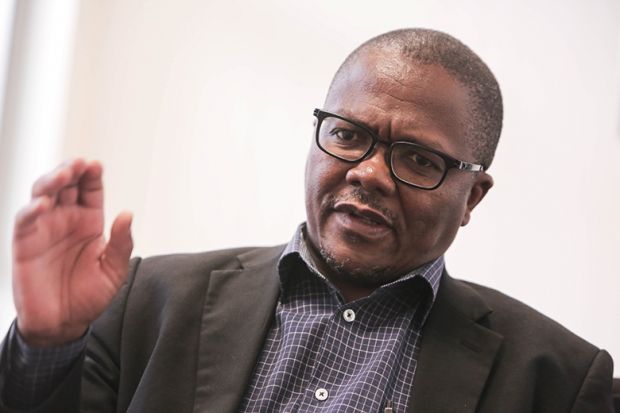A vice-chancellor who narrowly avoided a suspected assassination attempt that killed his bodyguard has vowed to see through his fight against corruption in South African higher education.
Sakhela Buhlungu, who has railed against the “cancer” of fraud in his institution, the University of Fort Hare, has seen members of his staff killed, threatened and kidnapped in recent months.
He said he did not take the job at the Eastern Cape institution to “duck bullets”. But he told Times Higher Education that the level of corruption he has found at the campus he has led since 2017 meant that stopping any time soon was not an option.
“People talk about state capture, but what people have been missing and what the Fort Hare episode has done, is to demonstrate that alongside what we call state capture, there is a phenomenon called university capture,” said the former dean of the University of Cape Town’s Faculty of Humanities.
He said Fort Hare’s resources were being siphoned off, for example, through overcharging for catering or property development, rigging tendering processes or hiring “bogus” professors.
But his attempts to “close the taps” – by speaking out publicly, and by making formal complaints to the country’s Special Investigating Unit – have had deadly consequences.
Petrus Roets, the university’s fleet manager, was gunned down last May after he testified in a disciplinary hearing against another employee.
Last month, Professor Buhlungu’s bodyguard, Mboneli Vesele, was shot dead after dropping him off at his home. There are suspicions that the vice-chancellor was the real target.
Professor Buhlungu said the loss of “gentle soul” Mr Vesele, his protector for the past six years, had left him feeling like “the world had come down”, and fearful that those seen to be assisting his project of renewal are regarded as “fair game”.
He said that one of his junior employees narrowly avoided being shot on the day of Mr Vesele’s funeral, while another was later “kidnapped in the dark by four armed men” and subsequently found tied up in his own flat.
He believes subtle attempts have been made by elements within the police force to quash investigations into the deaths of Mr Roets and Mr Vesele, and he perceives the involvement of some politicians who want “regime change at Fort Hare, because they want a more pliable vice-chancellor”.
“Some people say I am risking my life, but what would I do? Run? Run where?” said the labour relations expert.
“We can’t have a country run by criminals. We can’t have the good guys being chased away from their bona fide positions by criminals.”
Professor Buhlungu has called on South African president Cyril Ramaphosa to reassure those who are scared for their safety that the criminals will be found.
“Criminality of this kind will spread throughout higher education. Once you have violence and corruption of this kind, education and teaching and learning is going to suffer,” he warned.
“If you want to kill your higher education system, let criminality flourish as it is now.”
Experts agreed that tackling corruption was an urgent priority for the South African sector.
Public institutions, including universities, were increasingly “captured by corrupt elites and then utilised via networks of patronage”, mainly focused on tendering processes, said Alexander Beresford, associate professor in African politics at the University of Leeds, who suggested that the issue was particularly acute at Fort Hare.
“Because it is high stakes, in an economic environment like South Africa’s, with high levels of unemployment, these contests can turn violent when they go bad,” he said.
“If someone blows the whistle on this and calls out the corruption to expose people, it not only threatens the corrupt person but has implications for their entire network, which is dependent on their patronage. That’s why you are seeing people like Sakhela calling out corruption – he’s quite literally come in the firing line.”
Thuli Madonsela, professor of law at Stellenbosch University and a former public protector of South Africa, noted other allegations of graft across the sector, including academic appointments, student marks and sexual harassment.
She alleged there was often an “unwritten deal” between a vice-chancellor and ringleaders not to get in each other’s way, but said that greater solidarity was needed in higher education, and that more colleagues should come out in support of those affected.
“You need people to signify that they are in your corner and that it’s their fight,” she said.
Professor Buhlungu is calling for solidarity from the international higher education community to protect Fort Hare and its staff, and to combat corruption in the South African sector. He is also raising money for a trust fund to support Mr Vesele’s children.
“I’m not here courting danger; I’m here because I know by now that many people look up to me to say something, to stand and to show strength,” he said.
“As far as corruption is concerned, the fight continues. We are not going to stop.”
POSTSCRIPT:
Print headline: V-c risks life to clean up HE
Register to continue
Why register?
- Registration is free and only takes a moment
- Once registered, you can read 3 articles a month
- Sign up for our newsletter
Subscribe
Or subscribe for unlimited access to:
- Unlimited access to news, views, insights & reviews
- Digital editions
- Digital access to THE’s university and college rankings analysis
Already registered or a current subscriber? Login








